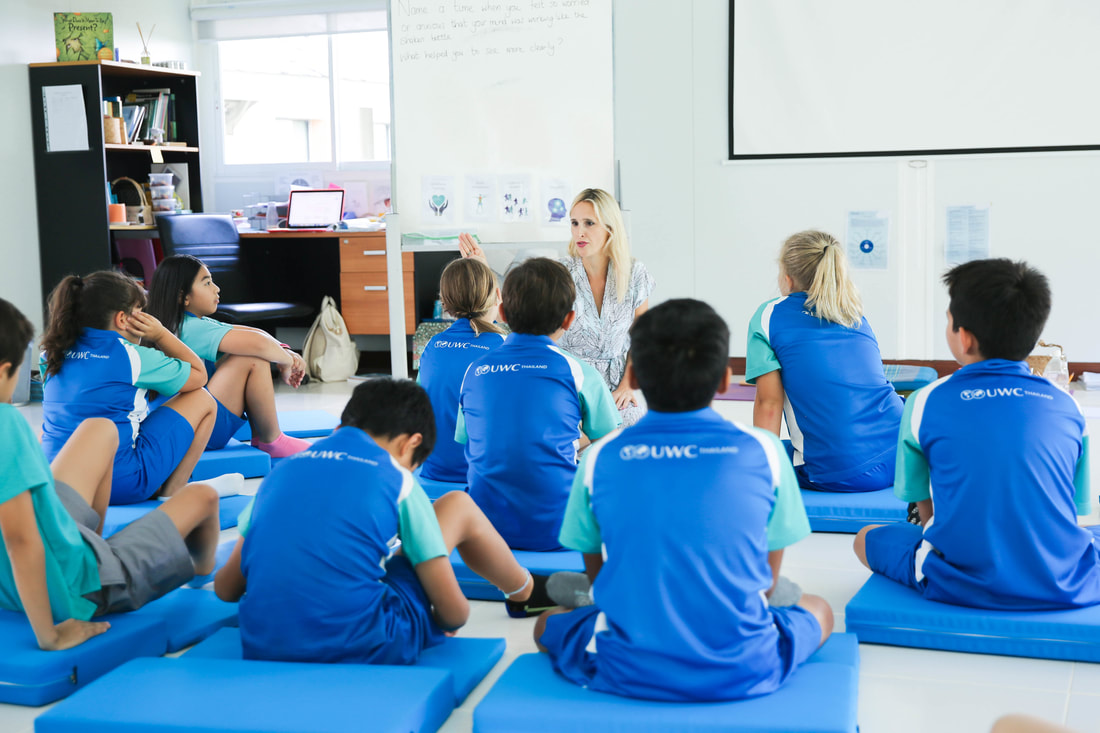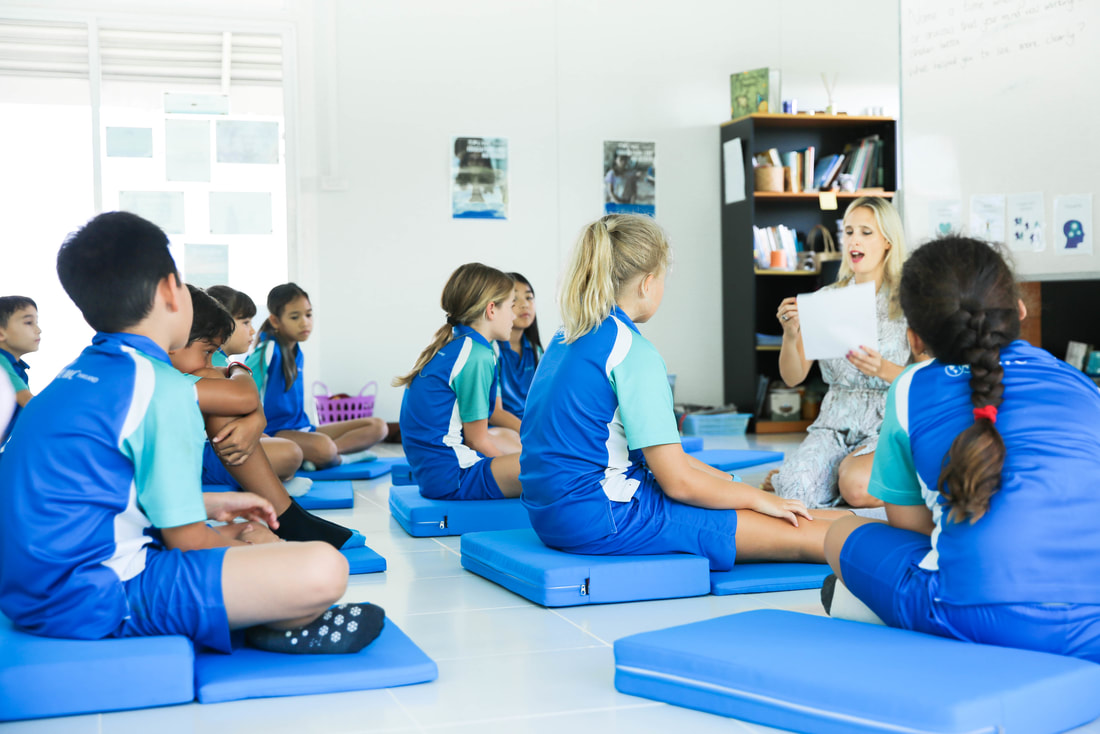UWC Thailand (UWCT) welcomed its community back last week with a brand-new addition to its campus: a purpose-built, student-centric Mindfulness Centre. As the island’s leader in mindfulness-based education, the addition - intentionally situated at the school’s main entrance - was well-received by students, staff and parents alike.
“Mindfulness is integral to a UWCT education, and has been an ongoing focus since the school was founded in 2008. When deciding where to locate the new centre, we chose the entrance of the school so that it would be the first thing guests at UWCT encountered and enquired about,” explained Jason McBride, UWCT’s Head of School. “It highlights our commitment to integrating mindfulness into campus life with a dedicated space for practicing.”
The centre is used each day for secular mindfulness practice by classes ranging from Nursery to Grade 12, where students explore how to ‘pay attention to the present moment, on purpose, with kindness and curiosity,’ with the school’s Mindfulness Mentor Kru Lucy Keller. UWCT’s boarding students also use the space for meditation and yoga in the evenings to ready themselves for a restorative night’s sleep.
“With mindfulness, students learn to give themselves the breathing room they require to take in what’s happening in and around them, see it more clearly through a positive lens, and react more intentionally. By being curious about, and attending to, present moment experiences students learn about their reactions, patterns, and themselves. They begin to understand that they have a choice and can take space to respond rather than react to everyday stresses. Mindfulness also supports students in developing self-compassion and through this, compassion for others,” said Keller.
In fact, Daniel Goleman and Richard. J. Davidson’s recently published book ‘Altered Traits-Science Reveals How Meditation Changes Your Mind, Brain and Body’ finds that there are five main ways mindful meditation impacts us in a positive way when practiced over time: it improves our resilience to stress, increases our compassion for others, improves attention and focus, increased selflessness, and a variety of health benefits including increased pain tolerance, reduced inflammation and cortisol, as well as an increase in an enzyme called telomerase known to increase cell life.
Mindfulness at UWCT goes beyond the students and is embedded into how the school’s teachers teach. It requires staff to be grounded in present moment awareness with an attitude of non-judgment, kindness, and curiosity. UWCT staff learn this first by participating in mindfulness training under the guidance of Keller and others through ongoing staff sessions. Teachers are encouraged to spread mindfulness throughout the day with short moments of stillness where relevant, particularly before and after special events, challenging news, testing or exams.
To assist in this endeavour, Keller co-plans with the teaching staff to help them look at other subject areas through a mindful lens. While during mock and final exams, students receive an exam along with a mindfulness schedule, where pre- and post-exam meditations of five and fifteen minutes take place to calm nerves and increase focus and then let go of any residual post-test stress.
The centre is used each day for secular mindfulness practice by classes ranging from Nursery to Grade 12, where students explore how to ‘pay attention to the present moment, on purpose, with kindness and curiosity,’ with the school’s Mindfulness Mentor Kru Lucy Keller. UWCT’s boarding students also use the space for meditation and yoga in the evenings to ready themselves for a restorative night’s sleep.
“With mindfulness, students learn to give themselves the breathing room they require to take in what’s happening in and around them, see it more clearly through a positive lens, and react more intentionally. By being curious about, and attending to, present moment experiences students learn about their reactions, patterns, and themselves. They begin to understand that they have a choice and can take space to respond rather than react to everyday stresses. Mindfulness also supports students in developing self-compassion and through this, compassion for others,” said Keller.
In fact, Daniel Goleman and Richard. J. Davidson’s recently published book ‘Altered Traits-Science Reveals How Meditation Changes Your Mind, Brain and Body’ finds that there are five main ways mindful meditation impacts us in a positive way when practiced over time: it improves our resilience to stress, increases our compassion for others, improves attention and focus, increased selflessness, and a variety of health benefits including increased pain tolerance, reduced inflammation and cortisol, as well as an increase in an enzyme called telomerase known to increase cell life.
Mindfulness at UWCT goes beyond the students and is embedded into how the school’s teachers teach. It requires staff to be grounded in present moment awareness with an attitude of non-judgment, kindness, and curiosity. UWCT staff learn this first by participating in mindfulness training under the guidance of Keller and others through ongoing staff sessions. Teachers are encouraged to spread mindfulness throughout the day with short moments of stillness where relevant, particularly before and after special events, challenging news, testing or exams.
To assist in this endeavour, Keller co-plans with the teaching staff to help them look at other subject areas through a mindful lens. While during mock and final exams, students receive an exam along with a mindfulness schedule, where pre- and post-exam meditations of five and fifteen minutes take place to calm nerves and increase focus and then let go of any residual post-test stress.
While Keller is delighted to have the centre as a place to teach, her role is to ensure mindfulness is happening everywhere on campus, whenever needed throughout the day. One way this is done is through the practice of a morning “Time In” session in the secondary school and through ‘Morning Meetings’ in the Primary school.
Keller explained: “‘Time In’ is an invitation to pause, and pay attention with kindness and curiosity to things as they are.’ This is an ideal way to set the tone in creating a positive and productive learning environment by allowing students time to be present, self-aware and reflective. By training attention in this way, they create the space needed to be able to see more clearly and make more intentional decisions about how they move forward in their day. This is not only supportive to their own well-being and learning but also impacts the whole community as kindness is at the core mindfulness.
The practice of a “Morning Meeting” is based on the Responsive Classroom model, these meetings help create a sense of belonging and respect, allocating time at the start of the day for students to focus on developing their social-emotional skills using self-awareness and mindfulness practices, alongside team building and time to connect with others.”
The school also offers mindful parenting sessions so that the community can support UWCT students’ mindfulness practices at home. The school’s focus on mindfulness has attracted attention and visits from some of the world’s experts on mindfulness including Buddhist Monk and writer Matthieu Ricard - dubbed “the happiest man on Earth”; and B. Alan Wallace, one of the foremost Buddhist scholars and teachers on the planet.
In fact, Wallace - who has a study also referenced in ‘Altered Traits’ - will be at UWCT this November 17th and 18th to deliver a two-day seminar on his four aspects of mental balance framework from 9am to 3pm each day. All UWCT staff will be in attendance, as well as a number of secondary students and parents. For mindful Phuketians, this is an incredible opportunity to learn from a world-class expert, compliments of UWC Thailand and Thanyapura Sports & Wellness hotel. Those interested in attending should contact the school directly via [email protected]. Spaces are limited.
Keller explained: “‘Time In’ is an invitation to pause, and pay attention with kindness and curiosity to things as they are.’ This is an ideal way to set the tone in creating a positive and productive learning environment by allowing students time to be present, self-aware and reflective. By training attention in this way, they create the space needed to be able to see more clearly and make more intentional decisions about how they move forward in their day. This is not only supportive to their own well-being and learning but also impacts the whole community as kindness is at the core mindfulness.
The practice of a “Morning Meeting” is based on the Responsive Classroom model, these meetings help create a sense of belonging and respect, allocating time at the start of the day for students to focus on developing their social-emotional skills using self-awareness and mindfulness practices, alongside team building and time to connect with others.”
The school also offers mindful parenting sessions so that the community can support UWCT students’ mindfulness practices at home. The school’s focus on mindfulness has attracted attention and visits from some of the world’s experts on mindfulness including Buddhist Monk and writer Matthieu Ricard - dubbed “the happiest man on Earth”; and B. Alan Wallace, one of the foremost Buddhist scholars and teachers on the planet.
In fact, Wallace - who has a study also referenced in ‘Altered Traits’ - will be at UWCT this November 17th and 18th to deliver a two-day seminar on his four aspects of mental balance framework from 9am to 3pm each day. All UWCT staff will be in attendance, as well as a number of secondary students and parents. For mindful Phuketians, this is an incredible opportunity to learn from a world-class expert, compliments of UWC Thailand and Thanyapura Sports & Wellness hotel. Those interested in attending should contact the school directly via [email protected]. Spaces are limited.



 RSS Feed
RSS Feed
















